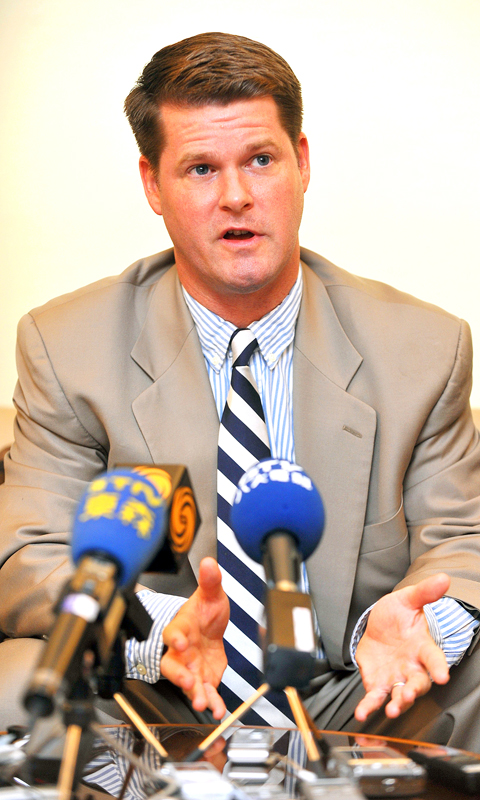A former senior US official said Taiwan must be “sober-minded” about China’s intent because China clearly intends to annex Taiwan through growing cross-strait relations.
“China has a strategy in cross-strait exchanges [that] they are very explicit and clear about. They seek unification … under the principle of ‘one country, two systems,’” former US deputy assistant secretary of state Randall Schriver said.
“I think Taiwan’s goals are somewhat different,” he said.

PHOTO: LIU HSIN-DE, TAIPEI TIMES
Speaking on the second day of a conference analyzing the regional implications of China’s rise, Schriver, who now heads the Project 2049 Institute, said Taiwan must proceed with prudence in its cross-strait relationship.
He said two errors Taiwan could make in its exchanges with China were choosing a cautious and reluctant path leading to deepening isolation, or proceeding too quickly and “[cutting] deals that are perhaps somewhat naive of China’s intent.”
His comments at the conferece — titled “A Rising Chinese Hegemony and Challenges to the Region” — come three weeks after Taiwan and China signed the landmark Economic Cooperation Framework Agreement (ECFA) with China that will lower customs tariffs and trade barriers between the two countries.
Schriver said that strengthening the US-Taiwan relationship and ties with other regional neighbors should be seen as a priority, particularly after the ECFA.
This would create an important hedge for Taiwan if cross-strait exchanges were to rapidly change, he said.
On Taiwan’s democracy, he said it was important that the country continues to strengthen and protect its democracy, as it was a recent development and could potentially “erode and lose ground.”
“It’s very important for Taiwan to continue to keep its democracy strong and further perfect [it] … because I think it relates to Taiwan’s survival,” he said.
During the forum, panelists also conveyed fears that China’s growing global influence could have a serious impact on regional stability and deep ramifications for Taiwan’s security.
Saying that Taiwan, Japan and the US should resist China’s “aggressive diplomatic and military advances,” defense analyst Hideaki Kaneda said China sought to create a “multipolar world with China … as a superpower like the US.”
This could spell a worrying trend for Taiwan, as Beijing could leverage its increasing diplomatic and economic power against Taiwan’s sovereignty including pressuring the US to scale down or stop arms sales to the country, said Taiwan’s former top representative to the US.
“We need more weapons for Taiwan’s military defense — to deter China, but it is becoming more and more difficult to procure arms,” former Mainland Affairs Council chairman Joseph Wu (吳釗燮) said. “I’m concerned this will be the precedent.”

Three Taiwanese airlines have prohibited passengers from packing Bluetooth earbuds and their charger cases in checked luggage. EVA Air and Uni Air said that Bluetooth earbuds and charger cases are categorized as portable electronic devices, which should be switched off if they are placed in checked luggage based on international aviation safety regulations. They must not be in standby or sleep mode. However, as charging would continue when earbuds are placed in the charger cases, which would contravene international aviation regulations, their cases must be carried as hand luggage, they said. Tigerair Taiwan said that earbud charger cases are equipped

Foreign travelers entering Taiwan on a short layover via Taiwan Taoyuan International Airport are receiving NT$600 gift vouchers from yesterday, the Tourism Administration said, adding that it hopes the incentive would boost tourism consumption at the airport. The program, which allows travelers holding non-Taiwan passports who enter the country during a layover of up to 24 hours to claim a voucher, aims to promote attractions at the airport, the agency said in a statement on Friday. To participate, travelers must sign up on the campaign Web site, the agency said. They can then present their passport and boarding pass for their connecting international

UNILATERAL MOVES: Officials have raised concerns that Beijing could try to exert economic control over Kinmen in a key development plan next year The Civil Aviation Administration (CAA) yesterday said that China has so far failed to provide any information about a new airport expected to open next year that is less than 10km from a Taiwanese airport, raising flight safety concerns. Xiamen Xiangan International Airport is only about 3km at its closest point from the islands in Kinmen County — the scene of on-off fighting during the Cold War — and construction work can be seen and heard clearly from the Taiwan side. In a written statement sent to Reuters, the CAA said that airports close to each other need detailed advanced

The age requirement for commercial pilots and airline transport pilots is to be lowered by two years, to 18 and 21 years respectively, to expand the pool of pilots in accordance with international standards, the Ministry of Transportation and Communications announced today. The changes are part of amendments to articles 93, 119 and 121 of the Regulations Governing Licenses and Ratings for Airmen (航空人員檢定給證管理規則). The amendments take into account age requirements for aviation personnel certification in the Convention on International Civil Aviation and EU’s aviation safety regulations, as well as the practical needs of managing aviation personnel licensing, the ministry said. The ministry